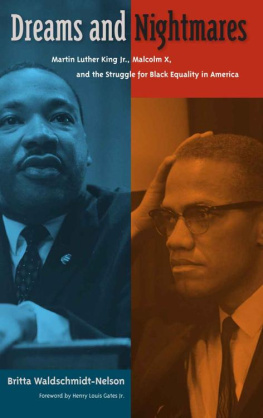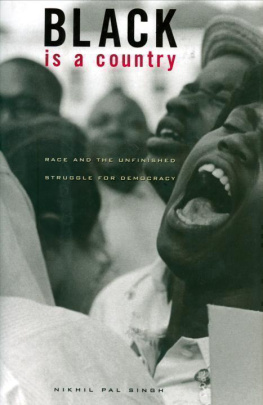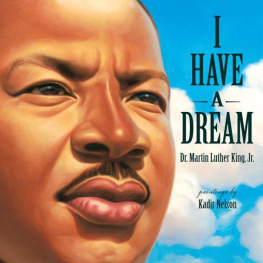Dreams and Nightmares
NEW PERSPECTIVES ON THE HISTORY OF THE SOUTH

UNIVERSITY PRESS OF FLORIDA
Florida A&M University, Tallahassee
Florida Atlantic University, Boca Raton
Florida Gulf Coast University, Ft. Myers
Florida International University, Miami
Florida State University, Tallahassee
New College of Florida, Sarasota
University of Central Florida, Orlando
University of Florida, Gainesville
University of North Florida, Jacksonville
University of South Florida, Tampa
University of West Florida, Pensacola
Dreams and Nightmares
Martin Luther King Jr., Malcolm X, and the Struggle for Black Equality in America

Britta Waldschmidt-Nelson
John David Smith, series editor
UNIVERSITY PRESS OF FLORIDA
Gainesville Tallahassee Tampa Boca Raton
Pensacola Orlando Miami Jacksonville
Ft. Myers Sarasota
Copyright 2012 by Britta Waldschmidt-Nelson
Printed in the United States of America on Glatfelter Natures Book, a paper certified under the standards of the Forestry Stewardship Council (FSC). It is a recycled stock that contains 30 percent post-consumer waste and is acid-free.
All rights reserved
16 15 14 13 12 6 5 4 3 2 1
LIBRARY OF CONGRESS CATALOGING-IN-PUBLICATION DATA
Waldschmidt-Nelson, Britta.
Dreams and nightmares : Martin Luther King Jr., Malcolm X, and the struggle for Black equality in America / Britta Waldschmidt-Nelson.
p. cm. (New perspectives on the history of the South)
From original German text entitled GegenSpieler (Fischer Verlag, 2001) with parts rewritten for an American audience; large parts of the introduction and the final chapter are completely newProvided by publisher.
Includes bibliographical references and index.
ISBN 978-0-8130-3723-3 (acid-free paper)
1. King, Martin Luther, Jr., 1929-1968. 2. X, Malcolm, 1925-1965. 3. King, Martin Luther, Jr., 1929-1968Political and social views. 4. X, Malcolm, 1925-1965Political and social views. 5. King, Martin Luther, Jr., 1929-1968Influence. 6. X, Malcolm, 1925-1965Influence. 7. African American political activistsBiography. 8. African American civil rights workersBiography. 9. African AmericansCivil rightsHistory20th century. 10. Civil rights movementsUnited StatesHistory20th century.
I. Waldschmidt-Nelson, Britta. GegenSpieler. II. Title.
E185.97.K5W234 2012
323.0922dc23
[B]
2011018993
The University Press of Florida is the scholarly publishing agency for the State University System of Florida, comprising Florida A&M University, Florida Atlantic University, Florida Gulf Coast University, Florida International University, Florida State University, New College of Florida, University of Central Florida, University of Florida, University of North Florida, University of South Florida, and University of West Florida.

University Press of Florida
15 Northwest 15th Street
Gainesville, FL 32611-2079
http://www.upf.com
To Scotthusband, father, friendamazing in every way
Contents
Foreword
Within African American political discourse, the Reverend Dr. Martin Luther King Jr. and Malcolm X stand as opposite poles on a broad political continuum, metaphors for divergent philosophies of political liberation, philosophies they inherited from deep in the black intellectual tradition, at least to the middle of the nineteenth-century, and probably beyond. In Dreams and Nightmares, Britta Waldschmidt-Nelson, a German scholar of American political history, has created a fascinating narrative account of the relationship between these two seminal figures that brilliantly interweaves salient details from their public and private lives to trace in fine detail the inner and outer history of the civil rights movement.
Crisply and briefly, she quite valuably establishes the historical context of the civil rights movement by unearthing its rootsits continuities and discontinuitiesin the nineteenth-century antislavery movement. Issues of equal rights, voting rights, human rights, separatism, and Black Nationalism that so dominated the Civil Rights and Black Power movements in the 1950s and 1960s, she carefully shows us, first emerged over one hundred years earlier in the long and difficult battle to end human slavery in the United States. In the thought of Martin Luther King Jr. one can see manifested extensions of the principles of abolitionists such as Frederick Douglass; in the thought of the Douglass rival and antagonist, Martin R. Delany, Waldschmidt-Nelson reveals the intellectual precedents for the black nationalist philosophy of Malcolm X, demonstrating that the disagreements and contesting arguments between the two had been deeply rooted in the black tradition for well over a century. Her capacity to historicize these fraught issues of the sixties is one of her books many considerable strengths.
Starting with the origins of this tension between these two philosophies in the nineteenth century, she then traces the evolution of these opposing ideologies following Reconstruction as they surfaced in the theories of the accommodationist Booker T. Washington and the confrontational W.E.B. Du Bois. While both men sought to advance the race, their strategies differed fundamentally and, often, quite dramatically. Cast your bucket down here in the South, Washington admonished the freed slaves and their descendants; work at manual labor and the trades. Through exquisitely executed work, he argued, the freed slaves and their descendants would eventually find economic success through this strategy. Economic success, he deeply believed, would lead inevitably to political equality. Its an argument we hear today in Singapore, for example, and perhaps in China. Du Bois would have none of that. As the actor and activist Ossie Davis would later describe Malcolm X after his assassination, Du Bois represented one model of the full manhood of the race, our living, black manhood, as Davis put it in his eulogy for Malcolm. Du Bois stood immovably for racial pride and insisted that political equality and equal access to educationboth vocational and academic, at the highest levelswere the necessary prerequisites to the freedmans full equality. And there could be no compromise about this.
In Martin Luther King Jr. and in Malcolm X, Professor Waldschmidt-Nelson traces the same dueling temperaments, comparing and contrasting their lives and works toward an eventual convergence, or a possible convergence. They become, in her deft hands, metaphors for the central dyad of African American political history: integration versus separatism, the first born out of the hope and belief in the founding principles of the American nation, the other from wounded racial pride and the justifiable belief that American racism would never relent.
Ironically, near their deaths, the philosophies of the two would converge: the spiritual awakening that Malcolm X experienced in his pilgrimage to Meccathe possibilities that Islam offered for interracial justice and a nonracial brotherly lovemoved him closer to embracing the nonracial philosophy of resistance so characteristic of Dr. Kings movement. King, for his part, after his Nobel Prize for Peace in 1963 and his growing involvement in the movement against the Vietnam War, became progressively more critical and radical in his critique of American corporate capitalism and militarism. Had they lived, perhaps black history and American history would have unfolded profoundly differently over the second half of the twentieth century. We can only speculate.
Next page










